
LISA DART – SURVIVAL POETRY AND THE VOICES OF EXPERIENCE
I interviewed Lisa Dart, finalist in the Grolier, Aesthetica and Troubadour Poetry Prizes and author of The Linguistics of Light (poems, Salt, 2008), Fathom (prose
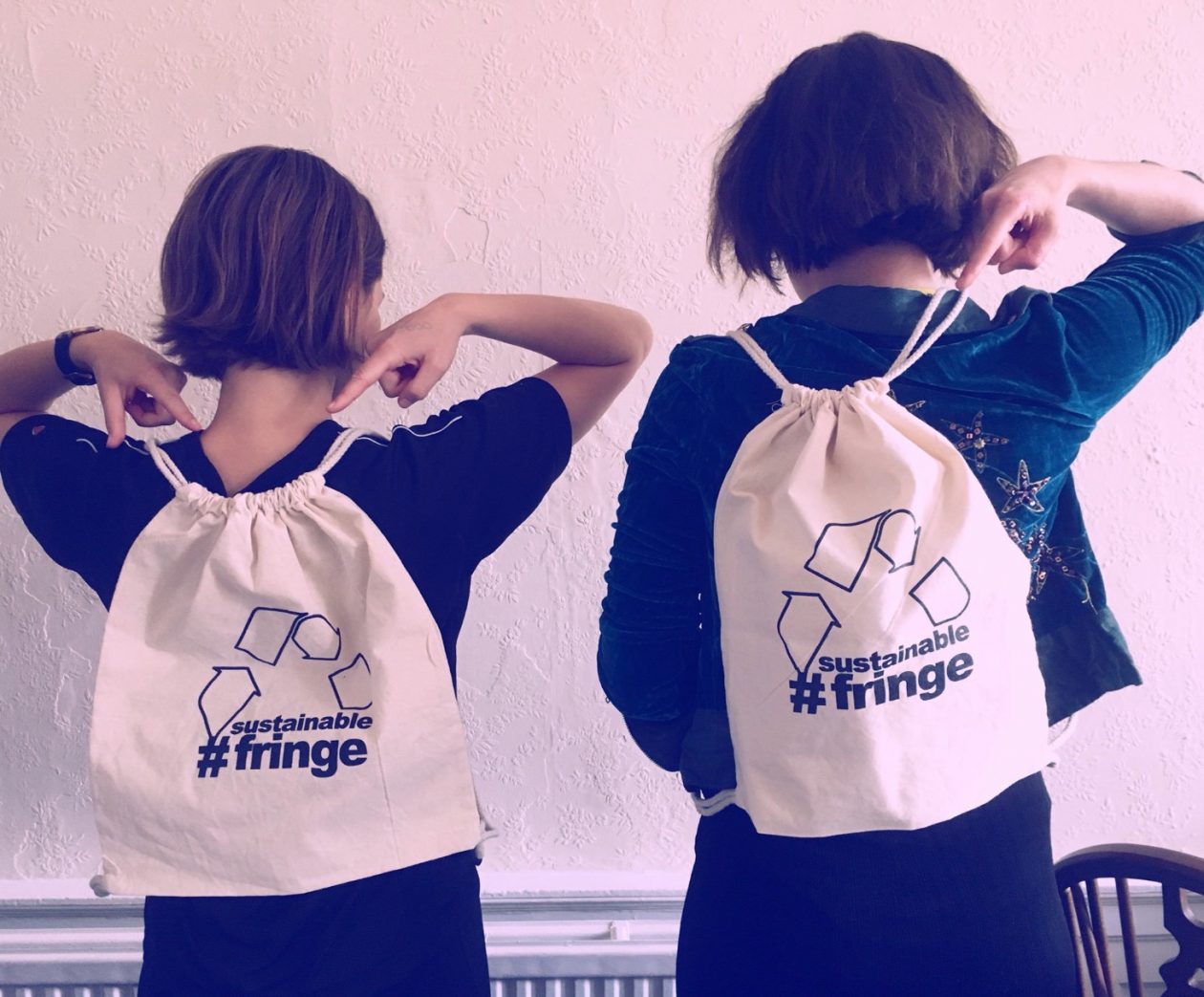
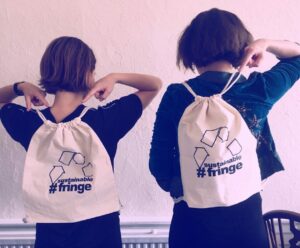
I interviewed Alice Boyd who works on improving environmental sustainability in the theatre/entertainment industry though the arts organisation Staging Change. Besides founding and co-directing Staging Change, Alice is also a theatre maker and sound designer with Poltergeist Theatre. She believes in reducing the carbon footprint of performances and bringing people together in a positive, sometimes humorous way, to face the truth about climate breakdown and bio-diversity loss.
The arts is the difference between knowing knowledge and feeling knowledge – Alison Tickell.
Leslie: How did stage and theatre first enter your life?
Alice: Theatre has been in my life for a long time. While I was growing up, I joined a local theatre group, which for me helped me come out of my shell and find a group of friends who were so important to my teenage years. It wasn’t until university however where I felt I found my groove. That’s where Poltergeist Theatre was formed, which built some creative and personal relationships that will stick with me forever. I’ve always struggled with choosing between my love of theatre and music, and my interests in environmental issues. Until recently, I thought I would have to choose between them.

Learning about organisations such as Julie’s Bicycle and Creative Carbon Scotland has opened my eyes to the importance of working in this space where the arts and the environment cross over. I once heard Alison Tickell, Founder and CEO of Julie’s Bicycle say, “the arts is the difference between knowing knowledge and feeling knowledge.” Our industry has an incredible capacity to communicate ideas and stories. This is what we need to express the urgency of the issues facing us today. It’s been shown time and time again that we’re more likely to act if something affects us emotionally. The theatre and entertainment industry has a real opportunity to use their unique skills to change the world for the better.
Leslie: Can you tell us, please, about ‘Staging Change’?
Alice: Staging Change is a growing network of performers, makers and venues who work together to improve the environmental sustainability of the theatre and entertainment industry. Staging Change’s core team, led by me and ThisEgg’s Josie Dale-Jones, organises campaigns, workshops and opportunities for network members to perform green work. Staging Change has been a long time in the making. In 2016, I performed at the Edinburgh Fringe Festival with my theatre company, Poltergeist. I tried to implement sustainable practice into our work, but I felt like there wasn’t a clear framework to do so, and it felt lonely when you didn’t know who else at the festival was doing the same. The following year, I went back to Edinburgh to carry out research for my dissertation on… you guessed it… environmental sustainability at the Fringe. I found that due to the festival’s decentralisation – aimed at opening up centrally curated arts festivals – it was less obvious where leadership and accountability should lie. It came clear that a collaborative effort between the venues, the Fringe Society, local organisations and those taking part would be needed to improve the sustainability of the festival.
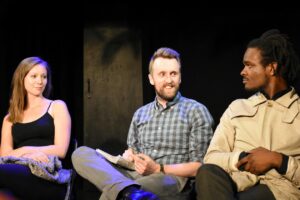
In 2018, before heading up to the Fringe for the third time, I launched a campaign with Poltergeist called #SustainableFringe. Our theatre company committed to three simple sustainable actions around plastic, paper and material waste. We encouraged other shows to do the same, which in turn began to build connections between Fringe-goers who wished to act on environmental issues at the festival. Over 100 individuals and shows pledged to the actions, which was amazing! From this it felt like a no-brainer to develop an initiative that went beyond the Fringe and could foster a network of artists trying to change the industry. After a few of months late-night idea shaping and website building, Staging Change was launched in February of 2019. Our small team is made up of early-career theatre makers, writers, designers and producers who are keen to ensure the future of theatre is green. As of May 2019, our network has over 100 individuals, groups and venues signed up, all of which are aiming to reduce their environmental impact, whether they are at the beginning of their sustainability journey or the greenest theatre machines around.
Leslie: Can you describe the collaborations that have driven ‘Staging Changes’ forward?
Alice We’re still in early stages, so we’re looking forward to the relationships that will grow in the months to come. However, we feel very lucky to have found some fantastic collaborators already. Our #SustainableFringe campaign at this summer’s Edinburgh Fringe Festival will no doubt go miles further with the support from the University of Edinburgh’s Social Responsibility and Sustainability team and Creative Carbon Scotland We’re looking forward to holding the ‘Start Your Sustainable Fringe’ day with both organisations at Fringe Central on 5th August.
Over the next months, we’re exploring connections elsewhere in the UK. Starting with London, on June 9th, we held a Sustainability Day at the Pleasance Theatre, Islington. Participants heard from a range of exciting performers, makers and designers working in sustainability and the arts. This included Extinction Rebellion and Culture Declares actor and activist, Tamaryn Payne; poet and actor, Femi Nylander, climate comedian, Matt Winning, and many others. These people are already in the fore of finding creative solutions to communicating environmental issues and are important in not only inspiring our work, but we hope that of the Staging Change network. However, we don’t want Staging Change to stop at the big cities. We want to reach anyone who is currently working in the theatre and entertainment industry who wishes to join the discussion.
Leslie: Who has inspired you – why them?
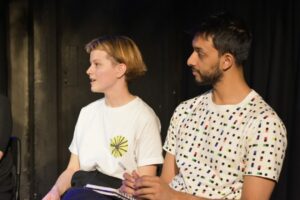
Alice: There have so been so many people who have influenced me and my work. Alison Tickell and the work of Julie’s Bicycle has been integral to my understanding of the place of the arts in climate action. I urge anyone to look at their resources or attend any of their events. Natalie Gerum, who was the coordinator at Pearson Seminar on Youth Leadership when I attended in 2014, opened my eyes to how you can create your own niche in the world by connecting the things that excite you most. Finally, a very funny clown called Lucy Hopkins recently reminded me of how fun it is to be an idiot… that making people laugh is a great way to make people feel and think. My good friend Rosa Garland (another inspiration!) and I have started developing a clown show called Two Super Super Hot Men, which is about Alan and Ron, a croc-wearing Hawaiian shirt-sporting duo. They are very very sweaty… and they are coming to terms with climate change. We hope to use laughter to connect people to the issue, while allowing space for our fears and anxieties to breathe.
Leslie: What are the obvious and less obvious differences between conventional and Green Arts?
Alice: I would say Green Arts aims to consider environmental sustainability at every point of a project. It doesn’t necessarily mean that your show is about environmental issues; the ‘green’ part might only come in your practice. We hope to give performers and makers the tools to make decisions that are better for the planet. Sometimes these decisions are complex and there’s not always a clear solution. However, by incorporating environmental sustainability into the conversations we have around our shows, we can start the conversation towards a greener industry.
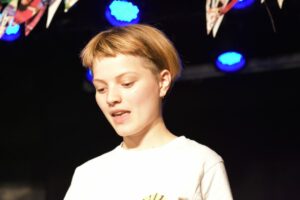
Leslie: How can people get involved?
Alice: Whether you’re a performer or maker, a venue or organisation, or just someone who wants to join the discussion, you can join our network or access our resources at www.stagingchange.com. Anyone is welcome!

I interviewed Lisa Dart, finalist in the Grolier, Aesthetica and Troubadour Poetry Prizes and author of The Linguistics of Light (poems, Salt, 2008), Fathom (prose

I interviewed writer Julia Lee Barclay-Morton about her experience of autism. Julia began as an experimental dramatist in New York, moving to the UK to

I interviewed Gillean McDougall from Glasgow, who edited the collaborative projects Honest Error (on Charles Rennie Mackintosh and his wife Margaret Macdonald) and Writing the

I interviewed French writer Delphine de Vigan, whose book, No et moi, won the prestigious Prix des libraires. Other books of hers have won a clutch

I interviewed Joanne Limburg whose poetry collection Feminismo was shortlisted for the Forward Prize for Best First Collection; another collection, Paraphernalia, was a Poetry Book Society Recommendation. Joanne
| Cookie | Duration | Description |
|---|---|---|
| cookielawinfo-checkbox-analytics | 11 months | This cookie is set by GDPR Cookie Consent plugin. The cookie is used to store the user consent for the cookies in the category "Analytics". |
| cookielawinfo-checkbox-functional | 11 months | The cookie is set by GDPR cookie consent to record the user consent for the cookies in the category "Functional". |
| cookielawinfo-checkbox-necessary | 11 months | This cookie is set by GDPR Cookie Consent plugin. The cookies is used to store the user consent for the cookies in the category "Necessary". |
| cookielawinfo-checkbox-others | 11 months | This cookie is set by GDPR Cookie Consent plugin. The cookie is used to store the user consent for the cookies in the category "Other. |
| cookielawinfo-checkbox-performance | 11 months | This cookie is set by GDPR Cookie Consent plugin. The cookie is used to store the user consent for the cookies in the category "Performance". |
| viewed_cookie_policy | 11 months | The cookie is set by the GDPR Cookie Consent plugin and is used to store whether or not user has consented to the use of cookies. It does not store any personal data. |